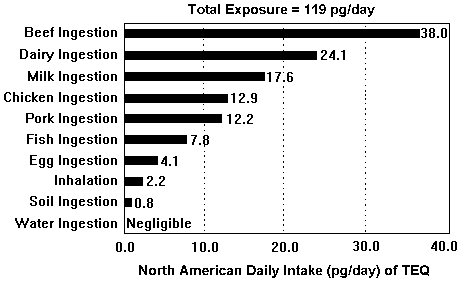Does dioxin cause cancer?
What other health problems are linked to dioxin exposure?
What other health problems are linked to dioxin exposure?
What other health problems are linked to dioxin exposure?
Dioxins and furans are some of the most toxic chemicals
known to science. A draft report released for public comment in September 1994
by the US Environmental Protection Agency clearly describes dioxin as a serious
public health threat. The public health impact of dioxin may rival the impact
that DDT had on public health in the 1960's. According to the EPA report, not
only does there appear to be no "safe" level of exposure to dioxin,
but levels of dioxin and dioxin-like chemicals have been found in the general
US population that are "at or near levels associated with adverse health
effects."
Dioxin is a general term that describes a group of hundreds
of chemicals that are highly persistent in the environment. The most toxic
compound is 2,3,7,8-tetrachlorodibenzene-p-dioxin or TCDD. The toxicity of
other dioxins and chemicals like PCB's that act like dioxin are measured in
relation to TCDD. Dioxin is formed as an unintentional by-product of many
industrial processes involving chlorine such as waste inceineration, chemical
and pesticide manufacturing and pulp and paper bleaching. Dioxin was the
primary toxic component of Agent Orange, was found at Love Canal in Niagara
Falls, NY and was the basis for evacuations at Times Beach, MO and Seveso,
Italy.
Dioxin is formed by burning
chlorine-based chemical compounds with hydrocarbons. The major source of dioxin
in the environment comes from waste-burning incinerators of various sorts and
also from backyard burn-barrels. Dioxin pollution is also affiliated with paper
mills which use chlorine bleaching in their process and with the production of Polyvinyl
Chloride (PVC) plastics and with the production of certain
chlorinated chemicals (like many pesticides).
If you're eating the typical North American diet,
this is where you are getting your dioxin from:
Dioxin is formed by burning chlorine-based chemical compounds with
hydrocarbons. The major source of dioxin in the environment comes from
waste-burning incinerators of various sorts and also from backyard burn-barrels.
Dioxin pollution is also affiliated with paper mills which use
chlorine bleaching in their process and with the production of Polyvinyl Chloride (PVC) plastics and with the production of certain chlorinated chemicals (like many pesticides). If you're eating the typical North American diet, this is where you are getting your dioxin from:

Chart from EPA Dioxin Reassessment Summary 4/94 - Vol. 1, p. 37
(Figure II-5. Background TEQ exposures for North America by pathway)
READ MORE: http://www.ejnet.org/dioxin/
No comments:
Post a Comment